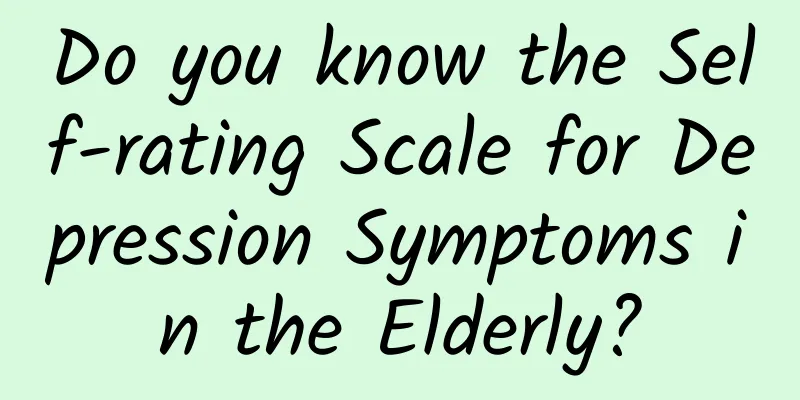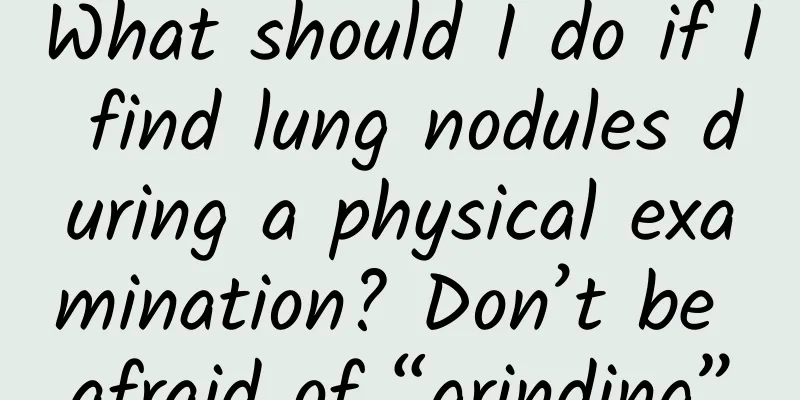Do you know the Self-rating Scale for Depression Symptoms in the Elderly?

|
Author: Wang Changhong, Chief Physician of the Second Affiliated Hospital of Xinxiang Medical College Reviewer: Li Yufeng, Chief Physician, Second Affiliated Hospital of Xinxiang Medical College As the aging process of the population continues to accelerate, the mental health of the elderly has become an important issue of social concern. Depression is an important indicator of mental health. Measuring the depressive symptoms of the elderly can effectively assess the mental health level of the elderly. At present, depressive symptoms can be assessed using a scale. Figure 1 Copyright image, no permission to reprint 1. What is the Self-rating Scale for Depression Symptoms in the Elderly? Depression symptoms in the elderly can impair their physical function and increase mortality. If depression symptoms in the elderly can be detected early and intervention is carried out early, the occurrence of various adverse events will be significantly reduced. There are many scales for screening depression symptoms in the elderly, one of which is the Self-Assessment Scale for Depression Symptoms in the Elderly compiled by Chinese scholars Wang Huali and others. This scale can understand whether the elderly have depressive symptoms, and can assess the severity of depressive symptoms and the efficacy of psychotherapy. In addition, this scale removes the problem of physical symptoms that may affect the test results of the elderly. It is suitable for both clinical diagnosis and treatment and research work, with good reliability and validity, and is highly practical for the elderly. 2. Requirements for the use of the Self-rating Scale for Depression Symptoms in the Elderly The Self-Rating Scale for Depressive Symptoms in the Elderly has good psychometric qualities and can be promoted and used among the elderly population, especially the following elderly populations. First, elderly people with chronic physical diseases . If chronic diseases are not prevented and treated in time, they will cause harm to the economy, life and other aspects. Elderly patients with chronic diseases need long-term maintenance drug treatment due to the long course of the disease, complex causes and prolonged illness. Therefore, elderly patients are prone to depression symptoms. Second, elderly patients with cognitive impairment . Depressive symptoms are common concomitant symptoms of mild cognitive impairment and can accelerate the transformation to mild cognitive impairment. Therefore, depressive symptoms in elderly patients should be identified as early as possible, and the influencing factors of depressive symptoms should be intervened to reduce the incidence of senile dementia and improve the mental health level of elderly patients. Third, the elderly with reduced self-care ability . The elderly often think that they are a burden to the family after their self-care ability declines, and are prone to self-denial, which in turn leads to negative emotions such as tension and anxiety, and also symptoms of depression. Figure 2 Copyright image, no permission to reprint How to use the Self-Assessment Scale for Geriatric Depression Figure 3 Copyright image, no permission to reprint The structure of the Self-Assessment Scale for Depression Symptoms in the Elderly is simple, with a total of 12 items, each of which is a question. In order to facilitate the elderly to answer, each item also lists specific manifestations or feelings, and the test subjects only need to answer "yes" or "no" according to their own situation. For example, the first item "appetite or weight changes" lists 3 different manifestations: ① Compared with usual, the appetite has become worse and eating is not delicious; ② Obvious weight loss; ③ Increased appetite and frequent hunger. The test subjects can answer according to their own situation. If there is one of the above 3 manifestations, answer "yes", if none of them, answer "no". After all the tests are completed, the current state of depression of the test subject can be judged according to the number of "yes" or "no" answers. The contents of the 12 items are as follows. 1. Changes in appetite or weight (1) Compared with usual, the appetite becomes worse and the appetite for food decreases. (2) Obvious weight loss. (3) Increased appetite and frequent feeling of hunger. 2. Sleep disorders (1) Insomnia. (2) Excessive sleep. (3) Still feeling sleepy after waking up. 3. Physical discomfort: You often experience various physical discomforts (such as chest tightness, palpitations, abdominal distension, pain, dizziness, dry mouth, sweating, hiccups, etc.). You go to the hospital for treatment and examination many times. When the doctor explains the condition to you, he is not clear about the cause. 4. Fatigue (1) Feeling that one’s physical strength is not as good as before. (2) Often feel tired, weak, and lack of energy. (3) Want to do something but don’t have the energy. 5. Laziness and Slowness (1) Becoming reluctant to talk or move. (2) You may also feel that you are speaking or moving very slowly or with some difficulty. 6. Anxiety (1) Feeling upset and unable to relax. (2) I am always worried and feel that I am worrying too much. (3) Restless. (4) You become more anxious and lose your temper more easily than before. 7. Depression (1) Feeling bad and unhappy most of the time. (2) Feeling depressed and painful. (3) Crying often. 8. Helplessness and despair (1) Feeling that life is hopeless. (2) Believing that the current situation is unlikely to improve. (3) Lack of confidence in treatment. 9. Self-blame (1) Feeling that you are a burden, feeling guilty, and feeling sorry for your family. (2) Often blame yourself. (3) Believing that one has made a serious mistake or committed a crime. 10. Suicidal thoughts or behaviors (1) Frequent thoughts about death. (2) Believing that “life is meaningless” or even that “life is worse than death”. (3) Preparing to commit suicide or even taking suicidal actions. 11. Lack of pleasant experience (1) Feeling as if you have become “numb.” (2) I cannot feel happy even when I should be happy about something. (3) You become indifferent to the people and things around you. 12. Loss of interest (1) You no longer have the interest to do things that you used to enjoy doing. (2) They find things that would normally interest other people boring or uninteresting. After the test is completed, if 3 or more items are selected as "yes", it is recommended that the subject contact a psychologist or psychiatrist for professional consultation. It should be noted that the screening results of the scale can be affected by the subject's subjective factors. Therefore, its screening results cannot be used to diagnose depression, but only provide a reference for clinical diagnosis. With the continuous improvement of the aging population, the mental health of the elderly has received increasing attention from relevant departments. The self-rating scale for depression symptoms in the elderly can be promoted and used among the elderly to more effectively assess the mental health level of the elderly and reduce the occurrence of depression in the elderly. References [1] An Shi, Yuan Juan, Chen Tao, et al. The mediating effect of self-rated health on the relationship between self-care ability and depressive symptoms in the elderly [J]. Journal of Nursing, 2022, 29(20): 55-59. |
<<: Can eating more spinach help you supplement iron? These foods are good for supplementing iron →
>>: Treatment of dental trauma in children
Recommend
What causes urinary tract infection in women
In various surveys conducted by some medical expe...
How should we prevent the recurrence of lung cancer?
Lung cancer is a serious malignant tumor. The inc...
How to hold your abdomen after giving birth
Although pregnancy is a very happy thing, many wo...
What is the cause of brown discharge during pregnancy?
When a woman is in the second trimester of pregna...
Is it normal to have lower abdominal pain and back pain after having an IUD inserted?
IUD insertion is a way for women to achieve perma...
How many days can I have sex during a biochemical pregnancy?
Ectopic pregnancy is also called subclinical misc...
Large pieces of fleshy discharge during menstruation
If a woman has large pieces of fleshy matter disc...
Postpartum pelvic floor recovery training method
A woman's pelvis will change after giving bir...
Why do women have abdominal pain when urinating?
If a woman experiences lower abdominal pain when ...
Which is less healthy, grilled or fried chicken? How to eat fried chicken legs healthier
In our daily diet, eating too much fried food is ...
What are the early symptoms of polycystic ovary?
Once suffering from polycystic ovary syndrome, fe...
Can pregnant women do leg lifts?
Compared to what we have heard in the past about ...
What is the reason for small particles in women's vagina?
Some women may find some small particles in their...
What to do if ovarian function declines
As women age, ovarian decline is inevitable. Howe...
Yoga dynamic diagram to relieve dysmenorrhea
Many female friends are troubled by menstrual cra...









